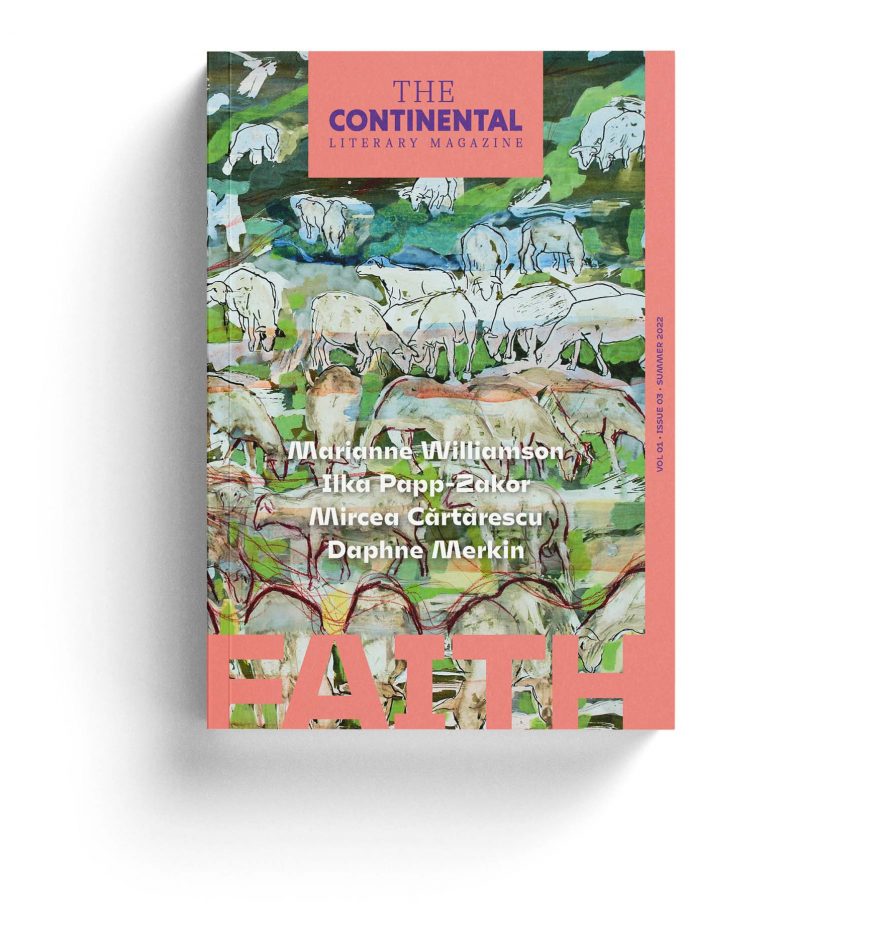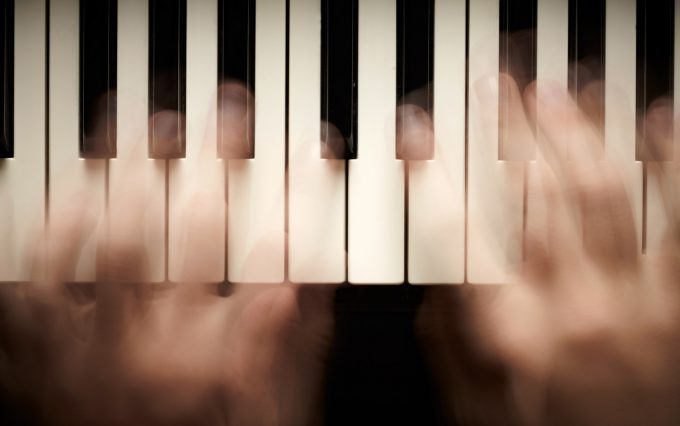
30th June 2022
Non-Fiction
6 minutes read
The Grass and the Night Sky
translated by Owen Good

30th June 2022
6 minutes read
“…sometimes we lose buttons – much to our annoyance – but we never rid ourselves of one intentionally. Before worn or passé garments end up in the bin, off come the durable, reusable buttons, so they can join their companions and await the rare moment when perhaps they might again come near a needle and proudly shine anew.”
From the preface to the monograph Buttons (Gombok).
DEDICATION
God bless you, Mum. If I can make such a wish for someone dead thirty-five years. Today you would be seventy-four. You never reached your thirty-ninth birthday. I’m sorry you won’t see me sitting here either, fingers tapping on the keys, nimble, like a pianist. Sometimes even the children are surprised to see me type so fast. It’s not a question of practice but fingering. Really, I’m playing the piano. The colors are the same – white letters, black keys. Remarkably, the eight years of piano-learning made typing so routine for me, it’s like I took classes. The piano that most certainly entered my life because of you. Though I wasn’t as gifted. But you had to abandon your dream. You couldn’t be a pianist. The soul was ripe but the body weak. Who’d have thought your thin-boned, fragile wrists and fingers wouldn’t cope? I can’t cope. Just imagine, for one book I had to be bandaged up to my elbows. The tops of my hands are covered in ganglions. This too will leave its mark. Writing. Tendonitis in the fingers and wrists. What if I were made of tougher stuff? I’m asking you a senseless, ahistorical question. Better put, I’m casting it into the void. Rhetorical questions are those for which we expect no answer, or so we learned in literature class. We expect nothing. The answer can be muddled, the result uncertain.
What would have happened had you not been conceived in the besieged city in 1944-45,
had your mother not carried you to full term in the cellar of the house on Mária Teréza Square? But you were conceived, then and there, in the capital city, starved through siege, and in the womb of an exceptional woman. Because Emília Haberl was no ordinary creature. Certainly it’s not ordinary for a starving person to choose not to eat beans. To claim she can’t swallow another spoonful. Even when the beans are camouflaged as chestnut puree. Even when she came from poverty, a child during the Great Depression, when a festive dessert meant powdered sugar on a bread roll. She was simply fussy. As picky as an aristocrat. She never ate the leftovers on your plate, even in the fifties, with four of you in the Nagymező Street apartment, four little children, and you weren’t the only ones who were poor, the whole country was. Where did this lofty, finicky manner come from? Applied exclusively to food and the words she used. Where did she get such elegance? Pregnant with you in the cellar, her face black with soot, her head in a scarf, terrified the Soviet soldiers might bash the door in at any moment? I recently learned that I was there too. Or rather, I had known already but hadn’t understood. That deep in Emília Haberl’s womb, where you quietly grew, was the egg that became me.
PSALMS 13
1 x button for silk-lined suit
The button was a spare for a jacket with a rusty brown silk lining. I’ve no clue what happened to the suit. Did Mum’s sister, my aunt Emőke, inherit it? They were roughly the same height and size. No buttons remain of the grass-green velvet suit in which my mum, Mária Ferenczi, was buried. We had just moved. So that finally we could live a little differently. A more comfortable, airier life, the kind where everyone has their deserved space. This happened a month before she died. Her dark blue shoes were in a cardboard box in the spare room of the new, spacious, Gutenberg Square apartment. Along with the footwear of all six family members. Every sandal, boot, and shoe that belonged to Mum, Miklós, and the four children. Back at Rajk László Street, we had packed in a hurry. At that time Miklós was working, my younger brother and I were in secondary, my sisters in primary, and Mum the hospital. Things fell apart in those months, each of us constantly carrying out chores and with no clue what would happen.
We hoped for the best.
And at the same time, we surely felt that everything was coming to an end. That the once predictable, familiar weekdays had grown wild, that we were traipsing through foggy, uneven bogland. Meanwhile, we clung to the order of our former life. There were shopping, cooking, and washing chores, and school, and work. But on top of all this was the improbable hospital-dash. And the move. One afternoon in May or June, I brought a jar of fruit soup to János Hospital. It must have been June because I remember it was cherry soup. I think school had finished. In those days Mum could still go out to the garden. She was having chemotherapy and wasn’t yet so unwell. But for the first time that afternoon it occurred to me we were in different dimensions. The axes had shifted.
“Look what I cooked for you, Mum,” I said, handing her the jar of pink liquid. “Cherry soup.”
We sat on the bench. The sun shone through the light green leaves.
“I know it’s cherry, I thickened it last night,” she answered, and pulled her robe over her thin nightie. I stared at her hand, at the plaster over the prepared vein. I looked at her eyes and saw she wasn’t with me. The previous night Miklós had said she was receiving morphine. We were packing the books into boxes. Working hard. . To make the new, spacious apartment on Gutenberg Square a success. To make everything fall into place. We had to rush the packing terribly. In the end, it was a success. We spent time together in the new apartment. Mum sat in the dining room, her small form nearly disappearing in the dark-brown chair, and together we shelled a bag of fresh peas. Vainly I told her she didn’t have to, that I’d do them, but she wanted to.
She was just glad to shell peas.
The green pearls popped into the plastic bowl, and every minute of the usually menial task became a celebration. We were together. Later, I carried over the basin of wet clothes while she sat there, and together we hung my sisters’ white knee socks on the line, the smoothed-out undershirts and T-shirts too. It was a ceremony. I told my fifteen-year-old brother, Attila, that Mum was dying. Early one morning we sat in the small square behind Rókus Hospital on a bench. We cried. And then just sat in silence. Staring as the swings swayed in the morning breeze.







